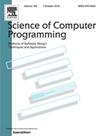Verification of forward simulations with thread-local, step-local proof obligations
IF 1.4
4区 计算机科学
Q3 COMPUTER SCIENCE, SOFTWARE ENGINEERING
引用次数: 0
Abstract
This paper presents a proof technique for proving refinements for general state-based models of concurrent systems that reduces proving forward simulations to thread-local, step-local proof obligations. The approach has been implemented in our theorem prover KIV, which translates imperative programs to a set of transition rules and generates proof obligations accordingly. Instances of this proof technique should also be applicable to systems specified with ASM rules, B events, or Z operations. To exemplify the proof methodology, we demonstrate it with two case studies. The first verifies linearizability of a lock-free implementation of concurrent hash sets by showing that it refines an abstract concurrent system with atomic operations. The second applies the proof technique to the verification of opacity of Transactional Mutex Locks (TML), a Software Transactional Memory algorithm. Compared to the standard approach of proving a forward simulation directly, both case studies show a significant reduction in proof effort.
用线程本地、步骤本地证明义务验证前向模拟
本文提出了一种证明技术,用于证明基于状态的一般并发系统模型的完善性,该技术将证明前向模拟简化为线程本地、步本地证明义务。这种方法已在我们的定理证明器 KIV 中实现,该定理证明器将命令式程序转换为一组转换规则,并生成相应的证明义务。这种证明技术的实例也应适用于使用 ASM 规则、B 事件或 Z 操作指定的系统。为了举例说明这种证明方法,我们通过两个案例研究进行了演示。第一个案例验证了并发哈希集合无锁实现的线性化,证明它完善了具有原子操作的抽象并发系统。第二个案例将证明技术应用于验证软件事务内存算法事务互锁(TML)的不透明性。与直接证明前向模拟的标准方法相比,这两项案例研究都显示证明工作量大大减少。
本文章由计算机程序翻译,如有差异,请以英文原文为准。
求助全文
约1分钟内获得全文
求助全文
来源期刊

Science of Computer Programming
工程技术-计算机:软件工程
CiteScore
3.80
自引率
0.00%
发文量
76
审稿时长
67 days
期刊介绍:
Science of Computer Programming is dedicated to the distribution of research results in the areas of software systems development, use and maintenance, including the software aspects of hardware design.
The journal has a wide scope ranging from the many facets of methodological foundations to the details of technical issues andthe aspects of industrial practice.
The subjects of interest to SCP cover the entire spectrum of methods for the entire life cycle of software systems, including
• Requirements, specification, design, validation, verification, coding, testing, maintenance, metrics and renovation of software;
• Design, implementation and evaluation of programming languages;
• Programming environments, development tools, visualisation and animation;
• Management of the development process;
• Human factors in software, software for social interaction, software for social computing;
• Cyber physical systems, and software for the interaction between the physical and the machine;
• Software aspects of infrastructure services, system administration, and network management.
 求助内容:
求助内容: 应助结果提醒方式:
应助结果提醒方式:


